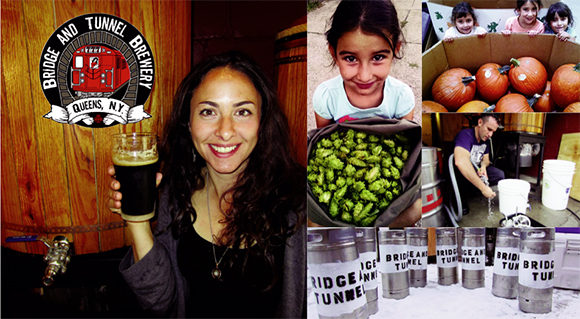Looking for a locally micro brewed beer rather than something shipped in massive quantities from St. Louis? Well it doesn’t get any more micro or local than Bridge and Tunnel Brewery.
The 2-year old outfit is operated out of a private home in Maspeth by Rich Castagna. Rich had been home-brewing for several years, which is completely legal so long as you don’t sell the product. But Rich always had the dream of operating his own brewery, and in 2012, the State Liquor Authority granted him a license to brew beer for sale.
Rich works out of his garage. His do-it-yourself setup consists of three 55-gallon stainless steel kettles which are covered in oak for insulation, and assorted accessory components. Most of the materials were recycled or repurposed from other uses or businesses. Bridge and Tunnel Brewery produces between 18 and 27 five-gallon kegs per month, using hops grown right in Rich’s backyard.
Rich prefers beers that are on the dark side, and that is what he brews. Some of his beers include a chipotle porter, coffee cream ale, black rye IPA, hazelnut brown ale, smoked scotch ale, dunkelweizen, milk stout, Belgian red IPA, Irish red ale, honey-spruce pale ale, and a session IPA. And most of them have been given very colorful names, such as:
Angry Amel Dunkelweizen, described as “A dark German style wheat beer, with a big clove/banana nose, a mouthful of malty goodness, and a clean finish, followed by that weizen aftertaste that keeps you coming back for more.” This beer was named after one of Rich’s crazy neighbors from when he was a kid.
Tiger Eyes Hazelnut Brown Ale, which is, “A brown ale modeled after English browns, deep mahogany in color, and a strong malty backbone that accentuates a moderate hazelnut presence in the flavor profile. Nothing overpowers anything else, and one bar owner described this as beer as ‘sweet, yet savory, with a clean quick finish’.” The name came from the color of the beer matching that of a tiger’s eyes.
Ol’ Gilmartin Milk and Oatmeal Stout is “A milk stout brewed with a generous addition of flaked oats in the mash. It’s sweet, malty, yet roasty, with the aim of being a little more a robust milk stout, thus capturing some flavor aspects of an oatmeal stout.” The name is a tribute to someone who was originally to be a partner in the brewery.
Slaughter House Stampede Black Rye IPA is “completely opaque, with a fluffy white head, a big citrus/ piney aroma from ample dry hopping, clean hop flavor, and a lot of back end bitterness to finish the job.” The name comes from a story that an elderly neighbor told Rich as a kid. Decades ago, cattle were offloaded at the Brooklyn Navy Yard and were run through the streets of Brooklyn to their final destinations at the local slaughterhouses.
Red Bird Express Belgian Red IPA has “a reddish hue, and fermented with a Belgian yeast strain. Lots of esters, and lots of back end bite.” This beer is named for the old red-painted 7 trains that used to run on the elevated line through Queens to Flushing.
Pickin’ Up The Change – Chipotle Porter is “a robust porter recipe, with the addition of smoked chipotle peppers in both the boil and in secondary. Roasty, chocolate notes in the aroma and flavor, along with a hint of smoke from the chipotles, followed by a back-end heat that is unmistakably smoky and warm.” The name comes from a slam dance move that originated out of New York City back in the mid 1980s.
Rich recently crafted a special beer variety, which he named 1642 Mespeatches Honey-Spruce Ale. As you may have guessed, the name honors the founding of Maspeth, which occurred in 1642 by settlers from Manhattan who were driven back by the native Indians the following year. This beer uses local Maspeth honey from Wilk Apiary, which was profiled in the last issue of the Juniper Berry. For balance, Rich actually tried juniper berries (the fruit, not the magazine…ha ha) in the recipe, but it didn’t taste quite right. He then turned to spruce tips, and they did the trick. All of the ingredients of this recipe are believed to have been available during the time of the original Maspeth settlement.
For this holiday season, Rich has launched 2 new beers – a vanilla porter, and a chair milk stout.
Over time, Rich has lived in Ridgewood, Long Island City, Astoria and Maspeth. He and his wife, Lisa, have 3 young daughters and several pets. He has a full-time job and plans to continue brewing part-time for the foreseeable future. He also has plans to expand.
Although the term “bridge and tunnel” has negative connotations for many, Rich says he chose the name because bridges and tunnels are what connect the city, not divide it. That’s certainly a refreshing way to look at it.
Because the beers are brewed in such small batches, they are served in a limited number of bars and restaurants. Rich also serves his beer at local beer and food festivals. He suggests that you check the Bridge and Tunnel Brewery’s Facebook page for the most up-to-date availability information. You can also visit his website at www.bridgeandtunnelbrewery.com.



